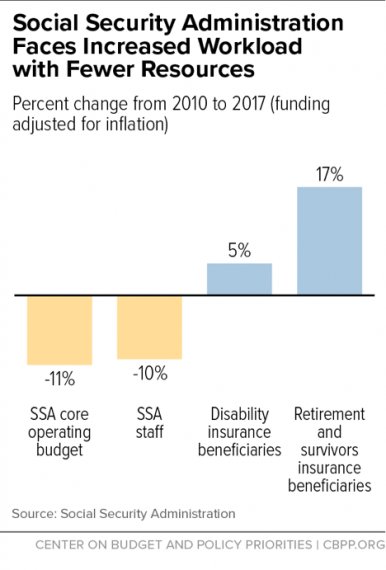Before I give a excerpt from this Washington Post article, let me make it clear that the President's 2019 budget is of little consequence. The recently passed budget deal will allow Social Security to end up with considerably more money. However, the President's budget does tell us something about this Administration's priorities and adequately funding the Social Security Administration isn't one of them.
For the elderly and disabled who complain about poor Social Security assistance now, these might be the good old days.
President Trump’s proposed fiscal 2019 Social Security Administration (SSA) budget would cut staffing, a recipe for long waits in agency offices and on the telephone ...
Declining service is nothing new, but under Trump, there would be fewer federal employees to deal with an increasing number of people of retirement age. His budget request calls for almost 1,000 fewer full-time-equivalent work years in 2019 than this year. ...
The advocacy group, National Committee to Preserve Social Security and Medicare, provides these stats to illustrate the problem: About 10,000 baby boomers hit retirement age every day. The increase in workloads coupled with a decrease in staffing led to a 627-day wait for disability applicants’ hearings in 2017. The three-minute telephone wait that callers had for SSA’s 800 number in 2010 was six times longer last year. Despite SSA attempts to direct traffic to its website, there were 2 million more field office visits in 2016 than 2015. “More than 16,000 visitors were forced to wait more than hour for service each day in August 2017,” the committee said. ...
Sue Bird, 66, of Wellington, Nev., told of driving 80 miles to a Social Security office in Reno. When she arrived for a 10 a.m. appointment, she estimated 20 to 30 people were standing outside, waiting to get in. Once she got in, she saw almost 150 waiting inside.
“The room was packed with people,” she said by telephone. “I was shocked.” ...
